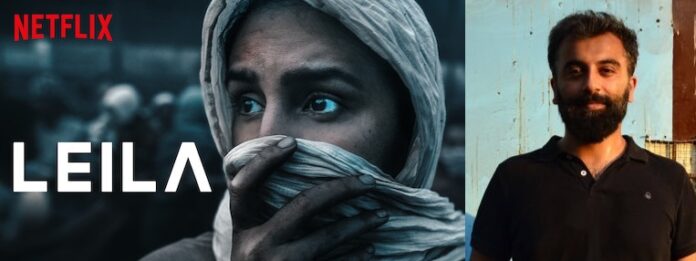I expect a political storm over Leila, a six-part TV serial on Netflix, the first season of which went on air last week.
The serial which has Huma Qureshi as the central character is Hinduphobic and foresees India becoming a totalitarian regime, priming itself for a genocide in the name of purification, a throwback to Adolf Hitler and his “purification” drive of ethnic cleansing which caused World War II. (Even the greeting—Jai Aryavarta—a la “Heil Hitler” is uncannily similar.)
It’s a frontal attack with no punches pulled. The clock is set on 2047, exactly 100 years since India’s independence. India has been replaced by Aryavarta, as “Bharat” was known in holy Hindu texts. Its’ a totalitarian, repressive regime: The show begins with the lynching of a Muslim man and poops drop at every stage to establish “love jihad”, “ghar wapsi,” “suit-boot” persona of its authoritarian head, the degrading conditions in Doosh (Dalit) camps etc.
The serial, directed by Deepa Mehta, is based on a work of Prayaag Akbar who deserves an introduction of his own. The young writer was once deputy editor of Scroll as well as a writer for Caravan, the two news outlets with the stench of Left. His lineage is even more interesting: Prayaag is son of MJ Akbar and unlike his father who swung from Congress to BJP with a straight face, the son has ventured too far into the Hinduphobic drain to have any possibility of “purification” in future.
There is no point picking holes in Prayaag’s work. It’s a free world, you have the licence of artistic freedom and the vehicle, Netflix, is free from local censor. You know exactly your audience as well as your funders, that media outlets and film critics of this ecosystem who would only unsheathe their pens in praise. You are turned into an icon by this system who can spot a peddler and his potential from a mile. May be this was his intention from the outset.
I say so because the serial lacks conviction in every next frame. Script is too convenient: the protagonist could will herself at 3-4 different places in a matter of a night in her quest to be at Commercial Centre in the morning. Surveillance always fails; frisking is always lax, the bosses are dumb idiots as the protagonist waltz from one room to another, one computer to another, her manager an accomplice hidden in plain sight. But how does it matter as long as you could stoke fears of an approaching fascist Hindu nation, overriding logic, reason, decency and all this without looking into a true mirror which reflects your dishonest self.
Let me put a writer-bucket challenge for Prayaag. The year is 2070, exactly 1500 years to Prophet Muhammad’s birth, peace be upon him. The Muslim world constitutes 90 per cent of humanity—not by repression or war but by the message of his piety, love for all. The prophet comes into dream of every Muslim on earth at a certain hour, minute and second of the night. How would you depict Prophet Muhammad? Would you dare give this role to any human actor?
No, you won’t. You can’t Prayaag. Nobody has dared so in hundreds of centuries: I hope it sobers you down to the orchestrated praise on your courage which is coming your way. I can even ask you on an easier script: Ever heard of Tughlaq or Aurangzeb; Khilji or Tipu Sultan? How about putting your creative juices at work on these subjects?
Everyone knows that chances of a dystopian Hindu regime in future is lesser than your car running on air. I mean in a country where you can’t even chant Jai Shri Ram or include “Veer” ahead of Savarkar or even vaguely mention “Hindi” as a link language, forget about Ram Temple, abolition of 370 and 35A, triple talaq etc, where army is independent, how would it come about. Who would burn up the Constitution? And what do you think forces in Pakistan, Saudi Arabia, China and United States etc, who might have invested in your project and who you might see as your investment in fame and money, would react? Let India be taken up by a totalitarian regime?
In showing India as a dystopian state in the making, Prayaag Akbar has insulted the wisdom and resilience of a 1.30 billion people. The fibre of our democracy. The basic tenet of peace and ahimsa which made “Aryavarta” never seek to invade, rape, kill or usurp countries. If he is looking for such traits, he would find aplenty in Islam and Christianity. To show a country which has suffered like no other nation in 1000 years as a monster-in-making is sin—and let Prayaag decipher it in whichever religion he follows. As for millions of Hindus, we are still under repression, by tools other than war. In the liberal world, they call it artistic licence. And a warning to Hindus: You just can’t drop your guard for the enemy is committed.


